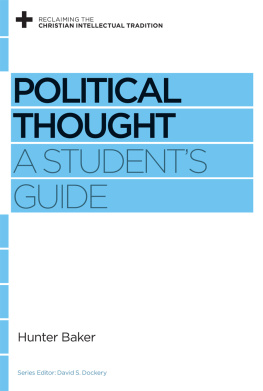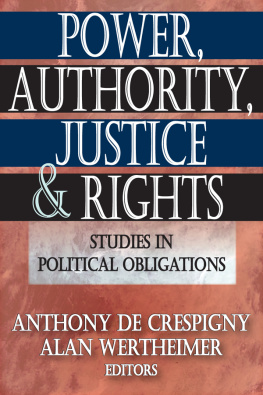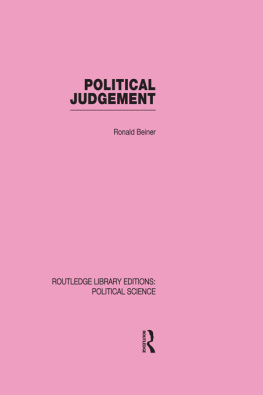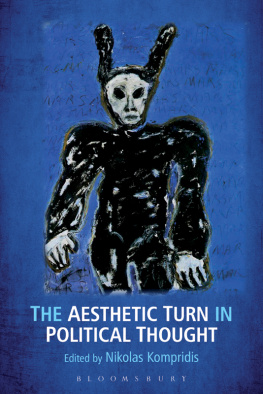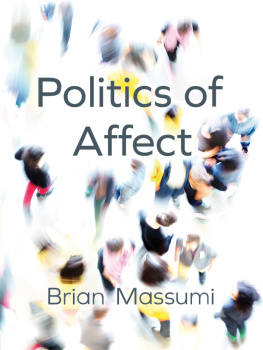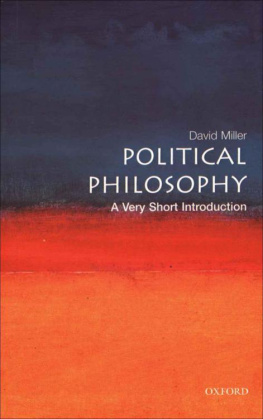CONTENTS
Political Thought: A Students Guide
Copyright 2012 by Hunter Baker
Published by Crossway
1300 Crescent Street
Wheaton, Illinois 60187
All rights reserved. No part of this publication may be reproduced, stored in a retrieval system, or transmitted in any form by any means, electronic, mechanical, photocopy, recording, or otherwise, without the prior permission of the publisher, except as provided for by USA copyright law.
Cover design: Jon McGrath, Simplicated Studio
First printing 2012
Printed in the United States of America
Unless otherwise indicated, Scripture quotations are from the ESV Bible ( The Holy Bible, English Standard Version ), copyright 2001 by Crossway. Used by permission. All rights reserved.
Trade paperback ISBN: 978-1-4335-3119-4
PDF ISBN: 978-1-4335-3120-0
Mobipocket ISBN: 978-1-4335-3121-7
ePub ISBN: 978-1-4335-3122-4
Library of Congress Cataloging-in-Publication Data
Baker, Hunter, 1970-.
Political thought : a students guide / Hunter Baker.
p. cm.(Reclaiming the Christian intellectual tradition)
Includes index.
ISBN 978-1-4335-3119-4 (tp)
1. Christianity and politics. 2. Christian sociology. 3. Political sciencePhilosophy. I. Title.
BR115.P7B144 2012
261.7dc23 2012001369
Crossway is a publishing ministry of Good News Publishers.
VP 20 19 18 18 17 16 15 14 13 12
14 13 12 11 10 9 8 7 6 5 4 3 8 2 1
RECLAIMING THE CHRISTIAN INTELLECTUAL TRADITION
The Reclaiming the Christian Intellectual Tradition series is designed to provide an overview of the distinctive way the church has read the Bible, formulated doctrine, provided education, and engaged the culture. The contributors to this series all agree that personal faith and genuine Christian piety are essential for the life of Christ followers and for the church. These contributors also believe that helping others recognize the importance of serious thinking about God, Scripture, and the world needs a renewed emphasis at this time in order that the truth claims of the Christian faith can be passed along from one generation to the next. The study guides in this series will enable us to see afresh how the Christian faith shapes how we live, how we think, how we write books, how we govern society, and how we relate to one another in our churches and social structures. The richness of the Christian intellectual tradition provides guidance for the complex challenges that believers face in this world.
This series is particularly designed for Christian students and others associated with college and university campuses, including faculty, staff, trustees, and other various constituents. The contributors to the series will explore how the Bible has been interpreted in the history of the church, as well as how theology has been formulated. They will ask: How does the Christian faith influence our understanding of culture, literature, philosophy, government, beauty, art, or work? How does the Christian intellectual tradition help us understand truth? How does the Christian intellectual tradition shape our approach to education? We believe that this series is not only timely but that it meets an important need, because the secular culture in which we now find ourselves is, at best, indifferent to the Christian faith, and the Christian worldat least in its more popular formstends to be confused about the beliefs, heritage, and tradition associated with the Christian faith.
At the heart of this work is the challenge to prepare a generation of Christians to think Christianly, to engage the academy and the culture, and to serve church and society. We believe that both the breadth and the depth of the Christian intellectual tradition need to be reclaimed, revitalized, renewed, and revived for us to carry forward this work. These study guides will seek to provide a framework to help introduce students to the great tradition of Christian thinking, seeking to highlight its importance for understanding the world, its significance for serving both church and society, and its application for Christian thinking and learning. The series is a starting point for exploring important ideas and issues such as truth, meaning, beauty, and justice.
We trust that the series will help introduce readers to the apostles, church fathers, Reformers, philosophers, theologians, historians, and a wide variety of other significant thinkers. In addition to well-known leaders such as Clement, Origen, Augustine, Thomas Aquinas, Martin Luther, and Jonathan Edwards, readers will be pointed to William Wilberforce, G. K. Chesterton, T. S. Eliot, Dorothy Sayers, C. S. Lewis, Johann Sebastian Bach, Isaac Newton, Johannes Kepler, George Washington Carver, Elizabeth Fox-Genovese, Michael Polanyi, Henry Luke Orombi, and many others. In doing so, we hope to introduce those who throughout history have demonstrated that it is indeed possible to be serious about the life of the mind while simultaneously being deeply committed Christians. These efforts to strengthen serious Christian thinking and scholarship will not be limited to the study of theology, scriptural interpretation, or philosophy, even though these areas provide the framework for understanding the Christian faith for all other areas of exploration. In order for us to reclaim and advance the Christian intellectual tradition, we must have some understanding of the tradition itself. The volumes in this series will seek to explore this tradition and its application for our twenty-first-century world. Each volume contains helpful tools, such as a glossary, study questions, and a list of resources for further study, which we trust will provide helpful guidance for our readers.
I am deeply grateful to the series editorial committee: Timothy George, John Woodbridge, Michael Wilkins, Niel Nielson, Philip Ryken, and Hunter Baker. Each of these colleagues joins me in thanking our various contributors for their fine work. We all express our appreciation to Justin Taylor, Jill Carter, Allan Fisher, Lane Dennis, and the Crossway team for their enthusiastic support for the project. We offer the project with the hope that students will be helped, faculty and Christian leaders will be encouraged, institutions will be strengthened, churches will be built up, and, ultimately, that God will be glorified.
Soli Deo Gloria
David S. Dockery,
Series Editor
There are many ways one could go about writing an introductory text on political thought. Because this book is part of a series of volumes intentionally written to offer brief invitations to different academic subjects, I have chosen not to structure the book as a survey of the major thinkers.
Instead, I have elected to introduce readers to political thought through the use of familiar life circumstances, imaginative devices, and a discussion of the great themes, which have been important and remain so. Therefore, this is a book that ranges across things such as the family, the state of nature, order, justice, freedom, and Christianity.
It is my hope that the discussion will prove stimulating and that many who read this book will decide to make further and more detailed study in the area of political philosophy. Regardless, serious consideration of the issues raised here will lead to greater capacity for evaluating political proposals and the claims that go with them. I knew I was on the right track with this book when my wife, who has long had very little interest in politics and is very scientifically minded, read the manuscript and subsequently told me she suddenly began to see the things I had described in the text everywhere in the news.

